常用英语易错动词
(英语)英语动词易错剖析及解析

(英语)英语动词易错剖析及解析一、动词1.Tom ________ his father, because they both are cheerful and easygoing.A. looks likeB. takes afterC. doesn't take afterD. isn't like 【答案】 B【解析】【分析】句意:Tom像他父亲,因为他们都很快乐随和。
take after和look like都含有“像……一样”之意,但是look like主要是指表面像,而take after指性格、气质等方面像。
又由后半句可知选B。
【点评】考查动词短语辨析。
2.When going upstairs or downstairs, we need to walk on the right, leaving the left space forthe people who _______.A. hurry upB. look aroundC. run away【答案】 A【解析】【分析】上下楼梯时,我们需要靠右行,留下左边的位置给赶急的人们。
A. hurry up赶快;B. look around浏览;到处察看;到处寻找; C. run away逃跑;失控;;根据语境及句意,故选A。
【点评】动副词组的意义具有多样性,我们应注意记忆并体会。
3.Grandfather lives with us. We all ________ him.A. look atB. look forC. look afterD. look like 【答案】 C【解析】【分析】句意:爷爷和我们住在一起,我们都照顾他。
A. look at看;B. look for 寻找;C. look after照顾;照看;D. look like看起来像…;根据语境及意义,故选C。
【点评】动词词组的意义多与组合所使用的词有关,学生要注意体会记忆。
易错英语单词变形
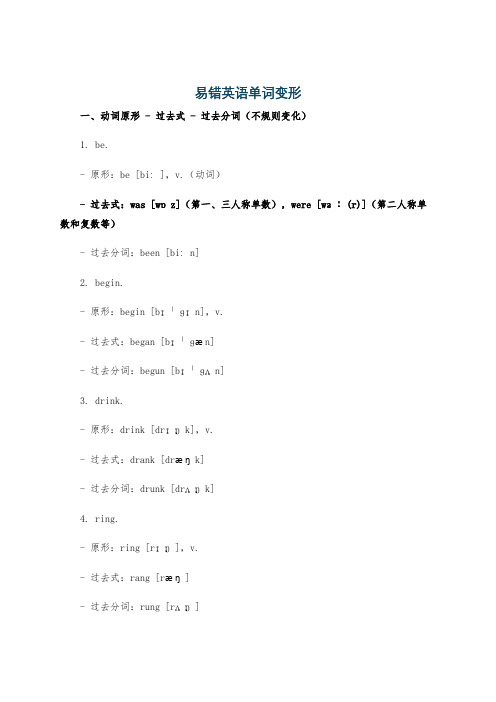
易错英语单词变形一、动词原形 - 过去式 - 过去分词(不规则变化)1. be.- 原形:be [biː],v.(动词)- 过去式:was [wɒz](第一、三人称单数),were [wɜː(r)](第二人称单数和复数等)- 过去分词:been [biːn]2. begin.- 原形:begin [bɪˈɡɪn],v.- 过去式:began [bɪˈɡæn]- 过去分词:begun [bɪˈɡʌn]3. drink.- 原形:drink [drɪŋk],v.- 过去式:drank [dræŋk]- 过去分词:drunk [drʌŋk]4. ring.- 原形:ring [rɪŋ],v.- 过去式:rang [ræŋ]- 过去分词:rung [rʌŋ]5. swim.- 原形:swim [swɪm],v.- 过去式:swam [swæm]- 过去分词:swum [swʌm]二、名词复数变形(特殊情况)1. child.- 原形:child [tʃaɪld],n.(名词)- 复数:children [ˈtʃɪldrən]2. foot.- 原形:foot [fʊt],n.- 复数:feet [fiːt]3. tooth.- 原形:tooth [tuːθ],n.- 复数:teeth [tiːθ]4. mouse.- 原形:mouse [maʊs],n.- 复数:mice [maɪs]三、形容词 - 副词(词尾变化)1. happy.- 原形:happy [ˈhæpi],adj.(形容词)- 副词:happily [ˈhæpɪli] 2. easy.- 原形:easy [ˈiːzi],adj. - 副词:easily [ˈiːzəli] 3. true.- 原形:true [truː],adj. - 副词:truly [ˈtruːli]。
初中英语单词:易错动词集锦(26)
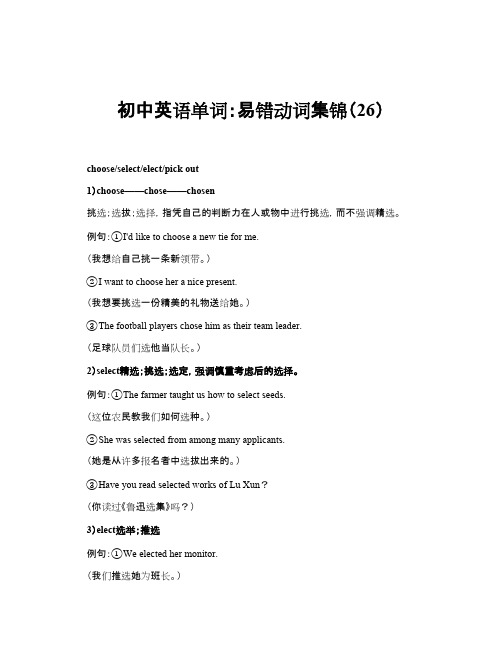
初中英语单词:易错动词集锦(26) choose/select/elect/pick out 1)choose——chose——chosen 挑选;选拔;选择,指凭自己的判断力在人或物中进行挑选,而不强调精选。
例句:①I'd like to choose a new tie for me. (我想给自己挑一条新领带。
) ②I want to choose her a nice present. (我想要挑选一份精美的礼物送给她。
) ③The football players chose him as their team leader. (足球队员们选他当队长。
) 2)select精选;挑选;选定,强调慎重考虑后的选择。
例句:①The farmer taught us how to select seeds. (这位农民教我们如何选种。
) ②She was selected from among many applicants. (她是从许多报名者中选拔出来的。
) ③Have you read selected works of Lu Xun? (你读过《鲁迅选集》吗?) 3)elect选举;推选 例句:①We elected her monitor. (我们推选她为班长。
) ②We elected him mayor. (我们选他为市长。
) 4)pick out 认出;挑出;挑选;多用口语 例句:①I picked out an old friend in a crowd. (我从人群中认出了一位老朋友。
) ②She picked out the shoes that match the dress. (她选出搭配那件衣服的鞋子。
)。
初二英语易错的不规则动词
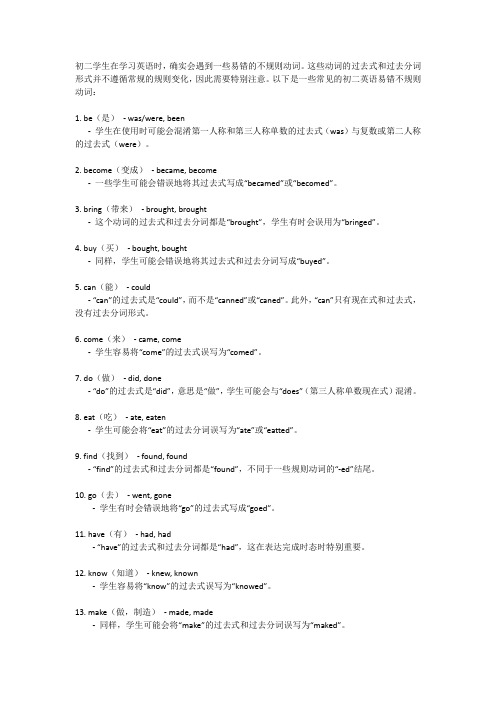
初二学生在学习英语时,确实会遇到一些易错的不规则动词。
这些动词的过去式和过去分词形式并不遵循常规的规则变化,因此需要特别注意。
以下是一些常见的初二英语易错不规则动词:1. be(是)- was/were, been-学生在使用时可能会混淆第一人称和第三人称单数的过去式(was)与复数或第二人称的过去式(were)。
2. become(变成)- became, become-一些学生可能会错误地将其过去式写成“becamed”或“becomed”。
3. bring(带来)- brought, brought-这个动词的过去式和过去分词都是“brought”,学生有时会误用为“bringed”。
4. buy(买)- bought, bought-同样,学生可能会错误地将其过去式和过去分词写成“buyed”。
5. can(能)- could- “can”的过去式是“could”,而不是“canned”或“caned”。
此外,“can”只有现在式和过去式,没有过去分词形式。
6. come(来)- came, come-学生容易将“come”的过去式误写为“comed”。
7. do(做)- did, done- “do”的过去式是“did”,意思是“做”,学生可能会与“does”(第三人称单数现在式)混淆。
8. eat(吃)- ate, eaten-学生可能会将“eat”的过去分词误写为“ate”或“eatted”。
9. find(找到)- found, found- “find”的过去式和过去分词都是“found”,不同于一些规则动词的“-ed”结尾。
10. go(去)- went, gone-学生有时会错误地将“go”的过去式写成“goed”。
11. have(有)- had, had- “have”的过去式和过去分词都是“had”,这在表达完成时态时特别重要。
12. know(知道)- knew, known-学生容易将“know”的过去式误写为“knowed”。
英语最易错认与错写的动词变化

加速;加速前行
50
swell
swelled
swollen/swelled
swelling
膨胀;增加
51
split
split
split
splitting
分割;分裂;分离
52
spread
spread
spread
spreading
传播;散布;伸展;散开
53
stand
stood
stood
standing
最易错认与错写的动词变化
最易错认的不规则动词
序号
动词原形
过去式
过去分词
现在分词
词义
1
arise
arose
arisen
arising
出现;发生;产生;起身;起立
2
awake
awoke
awoken
awaking
唤醒;觉醒,意识到;使醒来
3
bear
bore
borne
bearing
携带;忍受;承担;支撑;生育;结(果实)
lie
lied
lying
撒谎
21
lie
lain
lying
躺;位于;在于;处于某种状态
22
mislead
misled
misleading
误导;将……引入歧途
23
mix
mixed
mixing
混合
24
occur
occurred
occurring
发生;出现;被想起
25
permit
permitted
permitting
初中英语易错词汇

初中英语易错词汇1.affect 和effect:常被误用。
affect是动词,意为“影响”;effect是名词,意为“效果”或“影响”。
2.advice 和advise:advice是名词,意为“建议”;advise是动词,意为“建议”。
3.between 和among:between用于两者之间,among用于三者或三者以上之间。
4.borrow 和lend:borrow意为“借入”,lend意为“借出”。
5.bring 和take:bring意为“带来”,take意为“带走”。
6.can 和may:can表示能力或可能性,may表示许可或可能。
7.few 和little:few修饰可数名词,little修饰不可数名词。
8.healthy 和healthily:healthy是形容词,healthily是副词。
9.its 和it's:its是形容词性物主代词,it's是it is的缩写。
10.know 和knew:know是现在时,knew是过去时。
11.lie 和lay:lie是不及物动词,意为“躺”;lay是及物动词,意为“放置”。
12.lose 和miss:lose意为“丢失”,miss意为“想念”或“错过”。
13.noise 和voice:noise是噪音,voice是人的声音。
14.pass 和past:pass是动词,past是介词或副词。
15.problem 和question:problem指需要解决的问题,question指问题或疑问。
16.quiet 和quite:quiet是形容词,意为“安静的”;quite是副词,意为“非常”。
17.receive 和accept:receive指收到,accept指接受。
18.say 和speak:say强调说话内容,speak强调说话动作。
19.since 和for:since与时间点连用,for与时间段连用。
20.some time 和sometime:some time表示一段时间,sometime表示某个时候。
(英语)中考英语易错题专题三英语动词基本形式(含解析)

(英语)中考英语易错题专题三英语动词基本形式(含解析)一、动词基本形式1.—You aren't supposed to smoke in public.It's bad for our health.—Sorry,I will ______ my cigarette right now.A. give upB. put downC. put outD. give away【答案】C【解析】【分析】句意:——你不应该在公众场所吸烟。
这对我们的健康不好。
——对不起,我会马上戒掉香烟。
give up放弃,戒掉;put down放下;put out扑灭;give away捐赠。
根据It's bad for our health.可知吸烟有害健康,因此应戒掉,故选C。
【点评】此题考查动词短语辨析,熟记短语词义,根据语境选择合适的短语。
2.What me most is its sights.A. interested; interestedB. interested; interestingC. interesting; interestingD. interesting; interested【答案】 B【解析】【分析】根据选项可知句意为:最使我感兴趣的是它有趣的风景。
第一空应填动词,使......感兴趣interest,过去式为interested,故排除C和D。
第二空应填形容词修饰sights风景,应填ing形容词。
故选B。
3.Edison ________ the light bulb and Columbus ________ America.A. discovered; discoveredB. invented; discoveredC. invented; inventedD. discovered; invented【答案】 B【解析】【分析】句意:爱迪生发明了灯泡,哥伦布发现了美洲。
【英语】动词易错_高三英语(1)
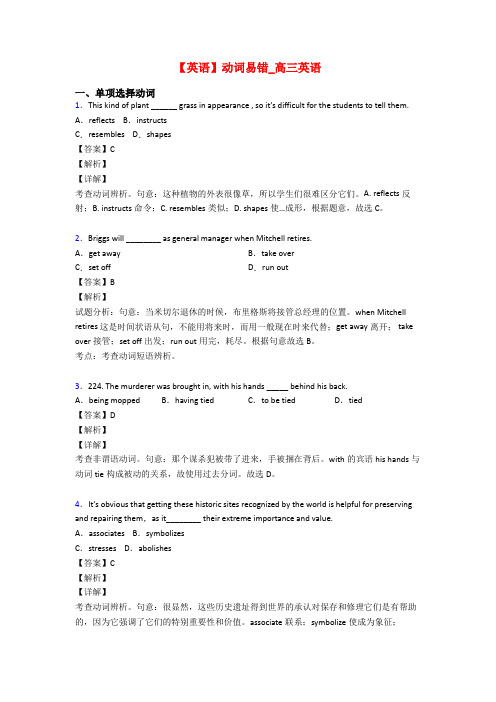
【英语】动词易错_高三英语一、单项选择动词1.This kind of plant ______ grass in appearance , so it’s difficult for the students to tell them. A.reflects B.instructsC.resembles D.shapes【答案】C【解析】【详解】考查动词辨析。
句意:这种植物的外表很像草,所以学生们很难区分它们。
A. reflects反射;B. instructs命令;C. resembles类似;D. shapes使…成形,根据题意,故选C。
2.Briggs will ________ as general manager when Mitchell retires.A.get away B.take overC.set off D.run out【答案】B【解析】试题分析:句意:当米切尔退休的时候,布里格斯将接管总经理的位置。
when Mitchell retires 这是时间状语从句,不能用将来时,而用一般现在时来代替;get away离开; take over接管;set off出发;run out用完,耗尽。
根据句意故选B。
考点:考查动词短语辨析。
3.224. The murderer was brought in, with his hands _____ behind his back.A.being mopped B.having tied C.to be tied D.tied【答案】D【解析】【详解】考查非谓语动词。
句意:那个谋杀犯被带了进来,手被捆在背后。
with的宾语his hands与动词tie构成被动的关系,故使用过去分词。
故选D。
4.It’s obvious that getting these historic sites recognized by the world is helpful for preserving and repairing them,as it________ their extreme importance and value.A.associates B.symbolizesC.stresses D.abolishes【答案】C【解析】【详解】考查动词辨析。
高中英语语法:动词不定式易错点
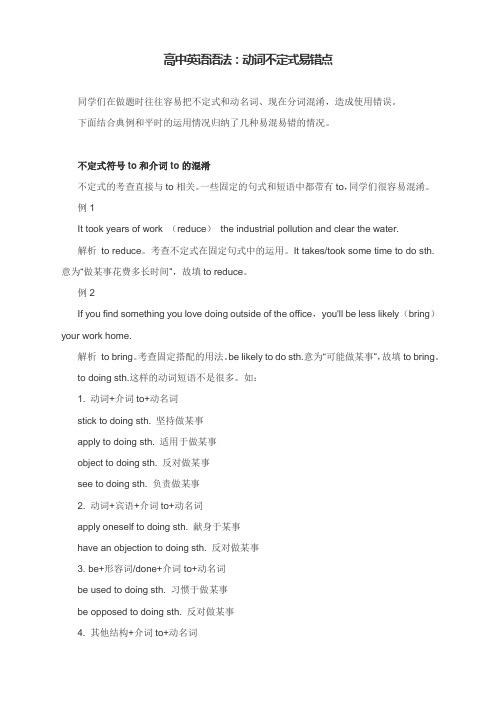
高中英语语法:动词不定式易错点同学们在做题时往往容易把不定式和动名词、现在分词混淆,造成使用错误。
下面结合典例和平时的运用情况归纳了几种易混易错的情况。
不定式符号to和介词to的混淆不定式的考查直接与to相关。
一些固定的句式和短语中都带有to,同学们很容易混淆。
例1It took years of work (reduce)the industrial pollution and clear the water.解析to reduce。
考查不定式在固定句式中的运用。
It takes/took some time to do sth.意为“做某事花费多长时间”,故填to reduce。
例2If you find something you love doing outside of the office,you'll be less likely (bring)your work home.解析to bring。
考查固定搭配的用法。
be likely to do sth.意为“可能做某事”,故填to bring。
to doing sth.这样的动词短语不是很多。
如:1. 动词+介词to+动名词stick to doing sth. 坚持做某事apply to doing sth. 适用于做某事object to doing sth. 反对做某事see to doing sth. 负责做某事2. 动词+宾语+介词to+动名词apply oneself to doing sth. 献身于某事have an objection to doing sth. 反对做某事3. be+形容词/done+介词to+动名词be used to doing sth. 习惯于做某事be opposed to doing sth. 反对做某事4. 其他结构+介词to+动名词get down to doing sth. 开始做某事look forward to doing sth. 盼望做某事动词后接动名词还是不定式作宾语例3I heard a passenger behind me shouting to the driver,but he refused (stop)until we reached the next stop.解析to stop。
英语易错动词
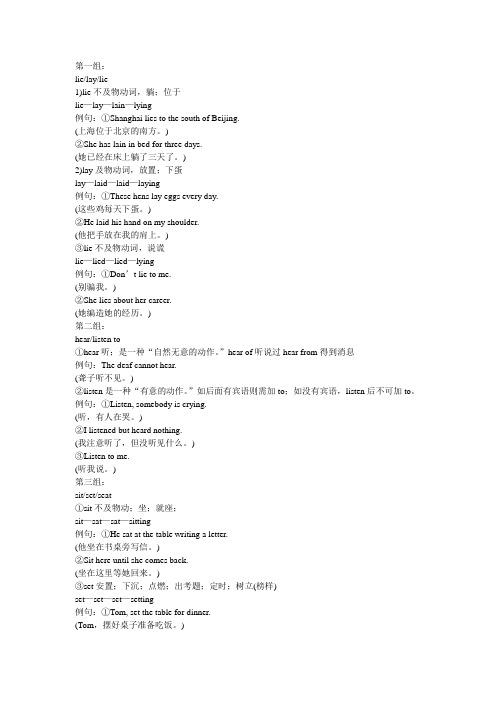
第一组:lie/lay/lie1)lie不及物动词,躺;位于lie—lay—lain—lying例句:①Shanghai lies to the south of Beijing.(上海位于北京的南方。
)②She has lain in bed for three days.(她已经在床上躺了三天了。
)2)lay及物动词,放置;下蛋lay—laid—laid—laying例句:①These hens lay eggs every day.(这些鸡每天下蛋。
)②He laid his hand on my shoulder.(他把手放在我的肩上。
)③lie不及物动词,说谎lie—lied—lied—lying例句:①Don’t lie to me.(别骗我。
)②She lies about her career.(她编造她的经历。
)第二组:hear/listen to①hear听;是一种“自然无意的动作。
”hear of听说过hear from得到消息例句:The deaf cannot hear.(聋子听不见。
)②listen是一种“有意的动作。
”如后面有宾语则需加to;如没有宾语,listen后不可加to。
例句:①Listen, somebody is crying.(听,有人在哭。
)②I listened but heard nothing.(我注意听了,但没听见什么。
)③Listen to me.(听我说。
)第三组:sit/set/seat①sit不及物动;坐;就座;sit—sat—sat—sitting例句:①He sat at the table writing a letter.(他坐在书桌旁写信。
)②Sit here until she comes back.(坐在这里等她回来。
)③set安置;下沉;点燃;出考题;定时;树立(榜样)set—set—set—setting例句:①Tom, set the table for dinner.(Tom,摆好桌子准备吃饭。
初中英语语法词汇学习:常考易错动词用法归纳1

初中英语语法词汇学习:常考易错动词用法归纳常用词cheat的用法与搭配1.表示“哄骗”“骗取”,是及物动词,其宾语通常是人而不是物。
如:He cheated the customers.他欺骗了顾客。
I won't have him cheat me. 我不能让他骗我。
要表示骗取某人某物,常用句型是cheat sb(out)of sth,注意其中的(out)of不能省略,因为cheat后面不能接双宾语。
如:他骗了这个老人的钱。
:He cheated the old man (out) of his money.误:He cheated (the old man) his money2.表示骗取某人做某事,其常用句型为 cheat sb into (doing)sth。
如:He cheated her into marrying him.他骗她嫁给他。
The man cheated me into believing [the belief that he is very rich.这个人骗我相信他很有钱。
3.表示“舞弊”“欺骗”,通常不及物,注意其后所接介词。
如:He always cheats at cards. 他在玩牌时总是作弊。
Students mustn't cheat in [on]examinations.学生不准在考试时舞弊。
动词cause用法要点cause 用作动词时,有两类用法需注意:要点一:表示“造成”“使(发生)”,注意以下搭配:①其后可直接用造成的结果或发生的事情作宾语。
如:Smoking can cause lung cancer.吸烟可导致肺癌。
Careless drivers cause accidents.司机不小心就出事故。
②后接双宾语。
如:The car caused me a lot of trouble.这车给我引来了不少麻烦。
I hope this will not cause you any inconvenience. 希望这不会给你造成不便。
【初中英语语法 时态】动词—ing形式易错点集锦

【初中英语语法时态】动词—ing形式易错点集锦1.因为习惯于在各种各样的地方驾车,他真是一个有经验的司机。
误:Used to drive the car in all kinds of places, he is really an experienced driver.正:Used to driving the car in all kinds of places, he is really an experienced driver. 析:句中的used to来自be used to,表示“习惯于做某事”的意思,to为介词,后面应接动词—ing形式作宾语。
Look forward to(渴望),get /become used to(习惯于做某事), stick to(坚持),get down to(着手),devote...to…(把…专用于…)等短语中的to 为介词,其后均应接动词—ing形式作宾语。
2.我建议你穿上大衣,因为外面很冷。
误:I suggest you to put on your overcoat, because it is very cold outside.正:I suggest your putting on your overcoat, because it is very cold outside.析:suggest, include, consider, finish, miss, avoid, risk, mind, stand, escape等动词后面只能接动词—ing形式作宾语。
your是putting on的逻辑主语。
3.因为很忙,他们不得不再次推迟结婚日期。
误:Being very busy, they have to put off to get married once again.正:Being very busy, they have to put off getting married once again.析:put off, excuse…for…, can’t help(忍不住…), insist on, keep on, give up, feel like 等动词后面只能接动词—ing形式作宾语,不能接动词不定式作宾语。
【英语】英语动词易错剖析及解析
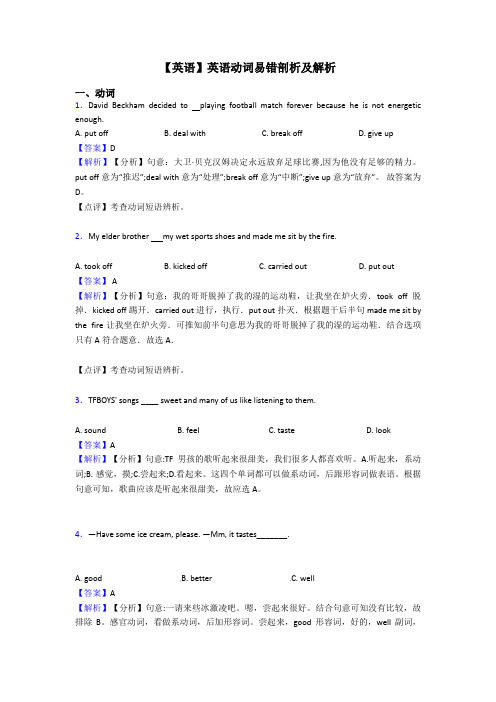
【英语】英语动词易错剖析及解析一、动词1.David Beckham decided to playing football match forever because he is not energetic enough.A. put offB. deal withC. break offD. give up【答案】D【解析】【分析】句意:大卫·贝克汉姆决定永远放弃足球比赛,因为他没有足够的精力。
put off意为“推迟”;deal with意为“处理”;break off意为“中断”;give up意为“放弃”。
故答案为D。
【点评】考查动词短语辨析。
2.My elder brother my wet sports shoes and made me sit by the fire.A. took offB. kicked offC. carried outD. put out【答案】 A【解析】【分析】句意:我的哥哥脱掉了我的湿的运动鞋,让我坐在炉火旁.took off脱掉.kicked off踢开.carried out进行,执行.put out扑灭.根据题干后半句made me sit by the fire让我坐在炉火旁.可推知前半句意思为我的哥哥脱掉了我的湿的运动鞋.结合选项只有A符合题意.故选A.【点评】考查动词短语辨析。
3.TFBOYS' songs ____ sweet and many of us like listening to them.A. soundB. feelC. tasteD. look【答案】A【解析】【分析】句意:TF男孩的歌听起来很甜美,我们很多人都喜欢听。
A.听起来,系动词;B. 感觉,摸;C.尝起来;D.看起来。
这四个单词都可以做系动词,后跟形容词做表语。
根据句意可知,歌曲应该是听起来很甜美,故应选A。
4.—Have some ice cream, please. —Mm, it tastes_______.A. goodB. betterC. well【答案】A【解析】【分析】句意:一请来些冰激凌吧。
易错易混动词的过去式及过去分词讲义-2022届高考英语二轮专题复习
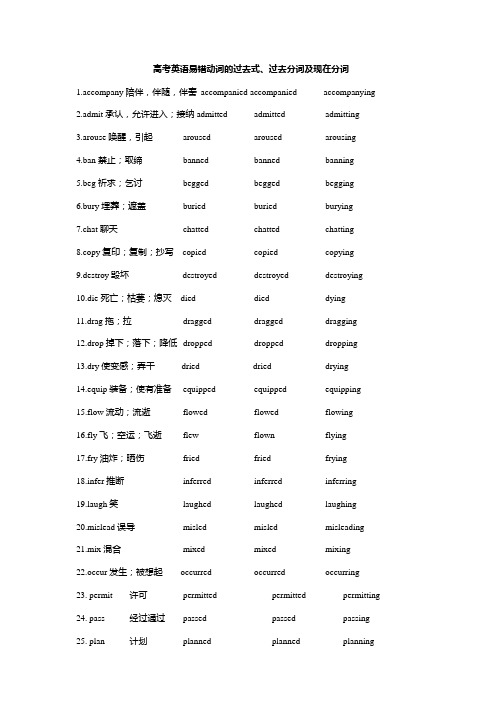
高考英语易错动词的过去式、过去分词及现在分词1.accompany陪伴,伴随,伴奏accompanied accompanied accompanying2.admit承认,允许进入;接纳admitted admitted admitting3.arouse唤醒,引起aroused aroused arousing4.ban禁止;取缔banned banned banning5.beg祈求;乞讨begged begged begging6.bury埋葬;遮盖buried buried burying7.chat聊天chatted chatted chatting8.copy复印;复制;抄写copied copied copying9.destroy毁坏destroyed destroyed destroying10.die死亡;枯萎;熄灭died died dying11.drag拖;拉dragged dragged dragging12.drop掉下;落下;降低 dropped dropped dropping13.dry使变感;弄干dried dried drying14.equip装备;使有准备equipped equipped equipping15.flow流动;流逝flowed flowed flowing16.fly飞;空运;飞逝flew flown flying17.fry油炸;晒伤fried fried frying18.infer推断inferred inferred inferringugh笑laughed laughed laughing20.mislead误导misled misled misleading21.mix混合mixed mixed mixing22.occur发生;被想起occurred occurred occurring23.permit 许可permitted permitted permitting24.pass 经过通过passed passed passing25.plan 计划planned planned planning26.raise 举起;提高;筹款;养育;提出raised raised raising27.step 跨步;踩踏stepped stepped stepping28.suffer受苦suffered suffered suffering29.tie系;捆;打成平局tied tied tying30.trap把.....困住,使陷入困境trapped trapped trapping。
英语动词易错剖析
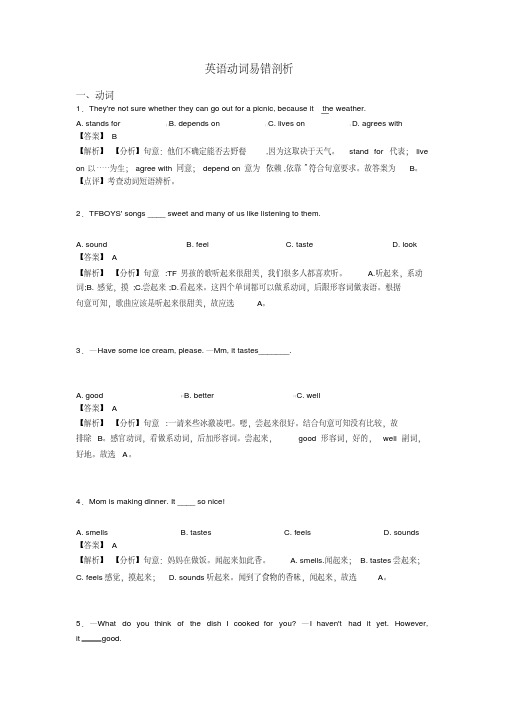
英语动词易错剖析一、动词1.They're not sure whether they can go out for a picnic, because it the weather.A. stands forB. depends onC. lives onD. agrees with【答案】B【解析】【分析】句意:他们不确定能否去野餐,因为这取决于天气。
stand for代表;live符合句意要求。
故答案为B。
on以……为生;agree with同意;depend on意为“依赖,依靠”,【点评】考查动词短语辨析。
2.TFBOYS' songs ____ sweet and many of us like listening to them.A. soundB. feelC. tasteD. look 【答案】A【解析】【分析】句意:TF男孩的歌听起来很甜美,我们很多人都喜欢听。
A.听起来,系动词;B. 感觉,摸;C.尝起来;D.看起来。
这四个单词都可以做系动词,后跟形容词做表语。
根据句意可知,歌曲应该是听起来很甜美,故应选A。
3.—Have some ice cream, please. —Mm, it tastes_______.A. goodB. betterC. well【答案】A【解析】【分析】句意:一请来些冰激凌吧。
嗯,尝起来很好。
结合句意可知没有比较,故排除B。
感官动词,看做系动词,后加形容词。
尝起来,good形容词,好的,well副词,好地。
故选A。
4.Mom is making dinner. It ____ so nice!A. smellsB. tastesC. feelsD. sounds 【答案】A【解析】【分析】句意:妈妈在做饭。
闻起来如此香。
A. smells.闻起来;B. tastes尝起来;C. feels感觉,摸起来;D. sounds听起来。
(英语)英语短语动词易错剖析及解析
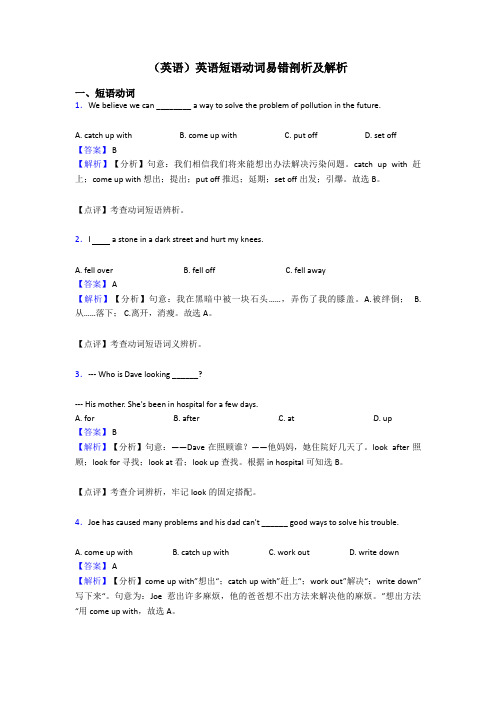
(英语)英语短语动词易错剖析及解析一、短语动词1.We believe we can ________ a way to solve the problem of pollution in the future.A. catch up withB. come up withC. put offD. set off【答案】 B【解析】【分析】句意:我们相信我们将来能想出办法解决污染问题。
catch up with赶上;come up with想出;提出;put off推迟;延期;set off出发;引爆。
故选B。
【点评】考查动词短语辨析。
2.I a stone in a dark street and hurt my knees.A. fell overB. fell offC. fell away【答案】 A【解析】【分析】句意:我在黑暗中被一块石头……,弄伤了我的膝盖。
A.被绊倒; B.从……落下; C.离开,消瘦。
故选A。
【点评】考查动词短语词义辨析。
3.--- Who is Dave looking ______?--- His mother. She's been in hospital for a few days.A. forB. afterC. atD. up【答案】 B【解析】【分析】句意:——Dave在照顾谁?——他妈妈,她住院好几天了。
look after照顾;look for寻找;look at看;look up查找。
根据in hospital可知选B。
【点评】考查介词辨析,牢记look的固定搭配。
4.Joe has caused many problems and his dad can't ______ good ways to solve his trouble.A. come up withB. catch up withC. work outD. write down【答案】 A【解析】【分析】come up with”想出“;catch up with”赶上“;work out”解决“;write down”写下来“。
【英语】动词易错_高三英语
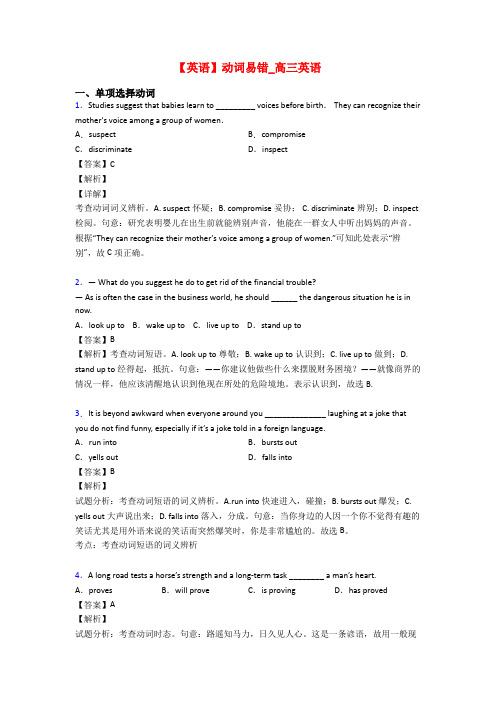
【英语】动词易错_高三英语一、单项选择动词1.Studies suggest that babies learn to _________ voices before birth. They can recognize their mother's voice among a group of women.A.suspect B.compromiseC.discriminate D.inspect【答案】C【解析】【详解】考查动词词义辨析。
A. suspect怀疑;B. compromise妥协; C. discriminate辨别;D. inspect 检阅。
句意:研究表明婴儿在出生前就能辨别声音,他能在一群女人中听出妈妈的声音。
根据“They can recognize their mother’s voice among a group of women.”可知此处表示“辨别”,故C项正确。
2.— What do you suggest he do to get rid of the financial trouble?— As is often the case in the business world, he should ______ the dangerous situation he is in now.A.look up to B.wake up to C.live up to D.stand up to【答案】B【解析】考查动词短语。
A. look up to尊敬;B. wake up to认识到;C. live up to做到;D. stand up to经得起,抵抗。
句意:——你建议他做些什么来摆脱财务困境?——就像商界的情况一样,他应该清醒地认识到他现在所处的危险境地。
表示认识到,故选B.3.It is beyond awkward when everyone around you ______________ laughing at a joke that you do not find funny, especially if it’s a joke told in a foreign language.A.run into B.bursts outC.yells out D.falls into【答案】B【解析】试题分析:考查动词短语的词义辨析。
英语易错动词
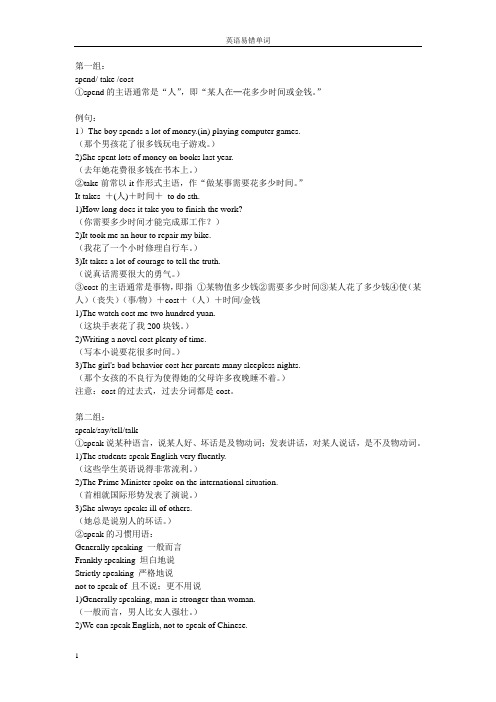
第一组:spend/ take /cost①spend的主语通常是“人”,即“某人在─花多少时间或金钱。
”例句:1)The boy spends a lot of money.(in) playing computer games.(那个男孩花了很多钱玩电子游戏。
)2)She spent lots of money on books last year.(去年她花费很多钱在书本上。
)②take前常以it作形式主语,作“做某事需要花多少时间。
”It takes +(人)+时间+to do sth.1)How long does it take you to finish the work?(你需要多少时间才能完成那工作?)2)It took me an hour to repair my bike.(我花了一个小时修理自行车。
)3)It takes a lot of courage to tell the truth.(说真话需要很大的勇气。
)③cost的主语通常是事物,即指①某物值多少钱②需要多少时间③某人花了多少钱④使(某人)(丧失)(事/物)+cost+(人)+时间/金钱1)The watch cost me two hundred yuan.(这块手表花了我200块钱。
)2)Writing a novel cost plenty of time.(写本小说要花很多时间。
)3)The girl's bad behavior cost her parents many sleepless nights.(那个女孩的不良行为使得她的父母许多夜晚睡不着。
)注意:cost的过去式,过去分词都是cost。
第二组:speak/say/tell/talk①speak说某种语言,说某人好、坏话是及物动词;发表讲话,对某人说话,是不及物动词。
1)The students speak English very fluently.(这些学生英语说得非常流利。
(英语)英语动词基本形式易错剖析含解析
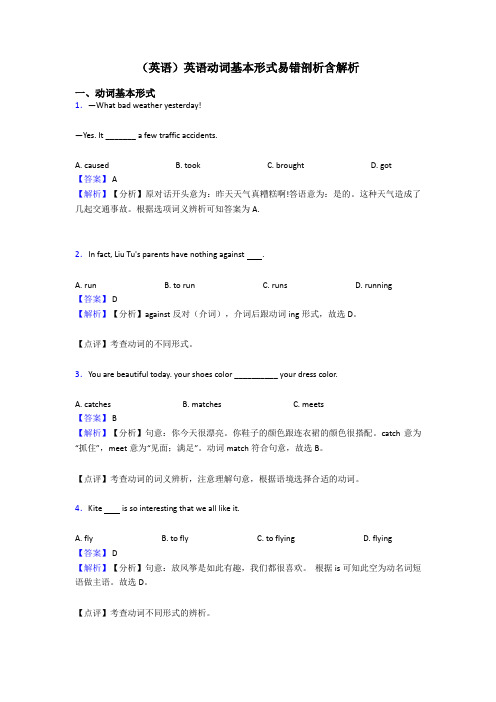
(英语)英语动词基本形式易错剖析含解析一、动词基本形式1.—What bad weather yesterday!—Yes. It _______ a few traffic accidents.A. causedB. tookC. broughtD. got【答案】 A【解析】【分析】原对话开头意为:昨天天气真糟糕啊!答语意为:是的。
这种天气造成了几起交通事故。
根据选项词义辨析可知答案为A.2.In fact, Liu Tu's parents have nothing against .A. runB. to runC. runsD. running【答案】 D【解析】【分析】against反对(介词),介词后跟动词ing形式,故选D。
【点评】考查动词的不同形式。
3.You are beautiful today. your shoes color __________ your dress color.A. catchesB. matchesC. meets【答案】 B【解析】【分析】句意:你今天很漂亮。
你鞋子的颜色跟连衣裙的颜色很搭配。
catch意为“抓住”,meet意为“见面;满足”。
动词match符合句意,故选B。
【点评】考查动词的词义辨析,注意理解句意,根据语境选择合适的动词。
4.Kite is so interesting that we all like it.A. flyB. to flyC. to flyingD. flying【答案】 D【解析】【分析】句意:放风筝是如此有趣,我们都很喜欢。
根据is可知此空为动名词短语做主语。
故选D。
【点评】考查动词不同形式的辨析。
5.The girl has a boyfriend Bill.A. callB. calledC. is calledD. is calling【答案】 B【解析】【分析】句意:那个女孩有个名叫比尔的男朋友。
- 1、下载文档前请自行甄别文档内容的完整性,平台不提供额外的编辑、内容补充、找答案等附加服务。
- 2、"仅部分预览"的文档,不可在线预览部分如存在完整性等问题,可反馈申请退款(可完整预览的文档不适用该条件!)。
- 3、如文档侵犯您的权益,请联系客服反馈,我们会尽快为您处理(人工客服工作时间:9:00-18:30)。
英语易错动词***spend/ take / cost/ pay for①spend的主语通常是“人”,即“某人在…花多少时间或金钱。
”Sb. spend…(in) doing sth.Sb. spend…on sth.1) The boy spends a lot of money.(in) playing computer games.(那个男孩花了很多钱玩电子游戏。
)2) She spent lots of money on books last year.(去年她花费很多钱在书本上。
)②pay for的主语也是“人”,即“某人为…支付多少钱。
”Sb. pay (some money) for sth.I paid two hundred yuan for the watch. (我花了200块钱买这块手表。
)= I spent two hundred yuan on the watch.= I spent two hundred yuan buying the watch.= The watch cost me two hundred yuan.③cost的主语通常是事物cost-cost-cost ①某物值多少钱②某物花了某人多少钱Sth. cost sb. some money1) The watch cost me two hundred yuan.(这块手表花了我200块钱。
)2) Writing a novel cost plenty of time.(写本小说要花很多时间。
)3) The girl's bad behavior cost her parents many sleepless nights.(那个女孩的不良行为使得她的父母许多夜晚睡不着。
)注意:cost的过去式,过去分词都是cost。
②take前常以it作形式主语,作“做某事需要花多少时间。
”It takes sb. some time to do sth.1) How long does it take you to finish the work?(你需要多少时间才能完成那工作?)2) It took me an hour to repair my bike.(我花了一个小时修理自行车。
)3) It takes a lot of courage to tell the truth.(说真话需要很大的勇气。
)*** speak/ say/ tell/ talk①speak说某种语言,说某人好、坏话,是及物动词;发表讲话,对某人说话,是不及物动词。
1) The students speak English very fluently.(这些学生英语说得非常流利。
)2) The Prime Minister spoke on the international situation.(首相就国际形势发表了演说。
)3) She always speaks ill of others.(她总是说别人的坏话。
)②speak的习惯用语:Generally speaking 一般而言Frankly speaking 坦白地说Strictly speaking 严格地说not to speak of 且不说;更不用说1) Generally speaking, man is stronger than woman.(一般而言,男人比女人强壮。
)2) We can speak English, not to speak of Chinese.(我们会读英语,汉语更不用说了。
)④say说出某句话或某件事;后接从句,(但say与从句之间不能直接接人称代词或名词);说明时间;书信、布告报纸上的“说”,习惯用法1) She said ,“I love you.”(她说:“我爱你。
”)2) Say goodbye to them.(跟他们说再见。
)3) She says she is busy.(她说她很忙。
)4) My watch says 10:00 sharp.(我的表是十点整。
)5) The paper says that there was a big fire in Shanghai.(报上说上海发生了一场大火)。
6) It is said that she has been away for a month.(据说她已走了一个月了)7) It goes without saying that education is important.(不用说,教育是重要的。
)8) Tom is a good student, that is to say, he gets good grades in school.(Tom是个好学生,也就是说,他在学校的成绩很好。
)③①tell说谎;讲故事;说实话1) Don't tell a lie.(不要说谎。
)2) She likes to tell stories.(她喜欢讲故事。
)3) We should always tell the truth.(我们应该永远说实话。
)②tell辨别;叫某人做某事;接“间接”与“直接”宾语;tell+宾语+that从句1) Sometimes we can't tell right from wrong.(有时我们无法辨别是非。
)2) He told me he would go there.(他告诉我他要去那儿。
)④talk连续地说话;习惯用法:talk with/ to/ about1) What are the girls talking about ?(那些女孩们讲什么?)2) Young people like to talk about politics.(年青人喜欢谈论政治。
)3) I talked over the matter with her.(我与她谈论了那个问题。
)*** join/join in/take part in/attend1)join vt. 加入(团体,组织,参军, 同……一起干或玩, 连接例:①I joined the Party in 1975.(我1975年入党。
)②His brother joined the army two years ago.(两年前他哥哥参军。
)③They are planning to join the two towns by a railway.(他们在计划用一条铁路把两个镇连接起来。
)2)join in 参加(某些活动)例:①May I join in your discussion?(我可以参加你们的讨论吗?)②Many people join in the game every year.(每年许多人参加这个游戏活动。
)③He joined in the work without a second thought.(他未加思索地参加了那项工作。
3)take part in 参加(群众性活动,会议等)参加者持积极态度,起一份作用。
例:①A lot of students took part in the thorough cleaning yesterday.(昨天许多学生参加大扫除。
)②A lot of college students took part in the movement last year.(去年很多大学生参加了那个运动。
)4)attend 出席,参加,到场;上学例:①Did you attend the meeting last week?(上星期你出席会议了吗?)②He was ill so he didn't attend his classes.(他生病了,所以没上学。
)注意:attend的词语搭配attend a ceremony 参加典礼attend a funeral 参加葬礼attend a lecture 听演讲attend a concert 听音乐会attend church 上教堂***take /bring/carry/fetch①take “带去”“拿去”例句:1) She'll take her children to the park.(她要带孩子去公园。
)2) It's raining, you'd better take an umbrella with you.(下雨了;你最好把雨伞带上②bring“拿来;带来”;1) Bring the dictionary to me.= Bring me the dictionary.(把字典拿给我。
)2) Please bring your report with you when you come tomorrow.(明天你来的时候,请把你的报告带来。
)③carry 携带,带去;搬运1)She always carries a red handbag.(她总是带一个红色手包。
)2)Please carry this TV set upstairs.(请把这台电视搬到楼上去。
)④fetch 去…取来,拿来;叫某人来1)The football is over there. Fetch it, please.(足球在那边呢,请把它拿回来。
)2)Fetch the police at once. We've found the robber.(马上去叫警察来,我们已经发现那个抢劫的人。
)*** wear/put on/ dress/ be in①wear 穿着,戴;留,表示“状态”, 是及物动词需加宾语例:1) She always wears a pair of glasses.(她总是戴着一副眼镜。
)2) He is wearing a black jacket today.(今天他穿着一件黑色的夹克。
)②put on 穿上,戴上,表示“动作”例:1) The teacher put on his hat and went out of the office.(老师戴上帽子然后走出办公室。
)2) Put on the gloves .It's cold outside.(戴上手套外面很凉。
)③dress 穿衣dress sb. / dress oneself (注意:dress后不能跟表示衣物的名词)例:1) She is dressed in red.(她穿着红衣服。
)2) The mother dresses the child every day.(那位母亲每天给孩子穿衣服。
